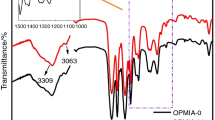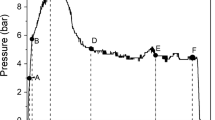Abstract
The depolymerization reaction of polyethylene terephthalate (PET) was analyzed on the basis of both experimental data and numerical data obtained from quantum chemistry calculations. Various alcohols were used as solvents in the search for the reaction mechanism. The activation energy obtained from the optimized structures of the ground state and the transitional state was compared with our experimental data. Based on these comparisons, it was found that the formation of rings from alkoxyl groups and carbonyl carbon atoms at the transitional state is highly important when the ester bonds of PET are broken. Moreover, the most appropriate alcohol was suggested for the depolymerization reaction.










Similar content being viewed by others
References
Pardal F, Tersac G (2006) Kinetics of poly (ethylene terephthalate) glycolysis by diethylene glycol. I. Evolution of liquid and solid phases. Polym Degrad Stab 91(12):2840–2847
Pardal F, Tersac G (2006) Comparative reactivity of glycols in PET glycolysis. Polym Degrad Stab 91(11):2567–2578
Ghaemy M, Mossaddegh K (2005) Depolymerisation of poly (ethylene terephthalate) fibre wastes using ethylene glycol. Polym Degrad Stab 90(3):570–576
Oku A, Hu LC, Yamada E (1997) Alkali decomposition of poly (ethylene terephthalate) with sodium hydroxide in nonaqueous ethylene glycol: a study on recycling of terephthalic acid and ethylene glycol. J Appl Polym Sci 63(5):595–601
Hu LC, Oku A, Yamada E, Tomari K (1997) Alkali-decomposition of poly (ethylene terephthalate) in mixed media of nonaqueous alcohol and ether. Study on recycling of poly (ethylene terephthalate). Polymer J 29(9):708–712
Mansour SH, Ikladious NE (2002) Depolymerization of poly (ethylene terephthalate) wastes using 1, 4-butanediol and triethylene glycol. Polym Testing 21(5):497–505
Hata S, Goto H, Yamada E, Oku A (2002) Chemical conversion of poly(carbonate) to 1, 3-dimethyl-2-imidazolidinone (DMI) and bisphenol A: a practical approach to the chemical recycling of plastic wastes. Polymer 43(7):2109–2116
Asakuma Y, Li Q, Nishimura M, Maeda K, Fukui K, Ang HM, Tade MO (2007) Colouring mechanism of dyed KDP crystal by quantum chemistry. J Mol Struc theochem 810:7–13
Encinar JM, González JF, Rodríguez-Reinares A (2007) Ethanolysis of used frying oil. Biodiesel preparation and characterization. Fuel Process Technol 88(5):513–522
Kulkarni MG, Dalai AK, Bakhshi NN (2007) Transesterification of canola oil in mixed methanol/ethanol system and use of esters as lubricity additive. Bioresour Technol 98(10):2027–2033
Hori K, Hashitani Y, Kaku Y, Ohkubo K (1999) ”Theoretical study on oxygen exchange accompanying alkaline hydrolysis of esters and amides. The role of water for the exchange reaction”. J Mol Struc theochem 461–462:589–596
Hori K, Ikenaga Y, Arata K, Takahashi T, Kasai K, Noguchi Y, Sumimoto M, Yamamoto H (2007) Theoretical study on the reaction mechanism for the hydrolysis of esters and amides under acidic conditions. Tetrahedron 63(5):1264–1269
Asakuma Y, Nakagawa K, Maeda K, Fukui K (2009) Theoretical study of the transesterification reaction of polyethylene terephthalate under basic conditions. Polym Degrad Stab 94(2):240–245
Author information
Authors and Affiliations
Corresponding author
Rights and permissions
About this article
Cite this article
Asakuma, Y., Yamamura, Y., Nakagawa, K. et al. Mechanism of Depolymerization Reaction of Polyethylene Terephthalate: Experimental and Theoretical Studies. J Polym Environ 19, 209–216 (2011). https://doi.org/10.1007/s10924-010-0263-3
Published:
Issue Date:
DOI: https://doi.org/10.1007/s10924-010-0263-3




